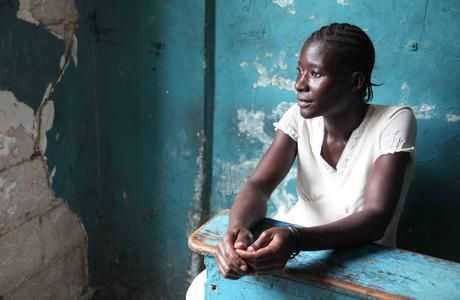Poems and photographs that Pulitzer Center grantees Kwame Dawes and Andre Lambertson completed in the wake of the Haiti earthquake have been combined into a multimedia performance, "Voices of Haiti." It will premiere at the National Black Theatre Festival August 2 and 3 in Winston-Salem, NC. GoTriad.com (Greensboro News & Record) published an article by Alexa Milan about the upcoming event:
WINSTON-SALEM —When Ghanaian Jamaican poet Kwame Dawes traveled to Haiti after the catastrophic earthquake that devastated the island nation in January 2010, he didn’t want to focus exclusively on the destruction and the poverty.
Instead, he wanted to tell the stories of people picking up the pieces and beginning the long recovery process that follows overwhelming loss.
People such as the pastor who set aside his own post-quake healing to help those suffering from HIV. Or the HIV-positive activist who built among the rubble a grass-roots organization for women.
Dawes’ poems from his visit are central to “Voices of Haiti,” a multimedia performance featured Tuesday and Wednesday at the National Black Theatre Festival in Winston-Salem. Dawes will read his poems while a slideshow of photographs by Andre Lamberston plays behind him.
Music by composer Kevin Simmonds and soprano Valetta Brinson will accompany the poetry.
“Just the performance element and the quality of the art, I think people will be moved by that,” Dawes said. “I’ve taken these poems around the country and gotten responses from people, and the thing that keeps coming back is they’re taken to a place emotionally they wouldn’t go to by just having the information.”
“Voices of Haiti” stems from a larger project by the Washington -based Pulitzer Center on Crisis Reporting, a nonprofit journalism organization focused on reporting international issues in depth across multiple platforms.
Dawes, Lamberston and reporter Lisa Armstrong had worked with the Pulitzer Center on past projects. When they approached the center about going to Haiti, the response was immediate.
“This was one of five different projects we did in Haiti since the earthquake for a number of different outlets,” said Jon Sawyer, executive director of the Pulitzer Center and a native of Winston-Salem. “We looked at everything from education and reconstruction to HIV/AIDS issues. The goal was to find as many innovative ways as we could to engage public attention.”
Dawes said seeing the devastation of the earthquake up close was indescribable, but what affected him most was the resilience of the survivors.
“I was just struck by the generosity of people,” he said. “I got there in April, a few months after the earthquake, but there was a real care for me. … I was watching people try to find a way to make a life after something as devastating and painful as an earthquake.”
After multiple trips to Haiti and hours of conversations with its residents, the team compiled the poems, photographs and articles into a multimedia presentation for the Pulitzer Center website. Sawyer said he was moved when he saw the finished product, the words and images that captured the strength and courage of a country in crisis.
Given the skills of those involved, Sawyer said, he wasn’t the least bit surprised by the piece’s emotional effectiveness.
“The thing about them is they really are extraordinarily good,” he said. “I thought they were telling the stories in great depth. You see the gestation of the process that begins with quite long interviews, and eventually they become Kwame’s poems. To see how you take this massive work and distill it to this crystalline version of who they are in a few words, it’s a remarkable talent.”
The Pulitzer Center’s online project won the Joan M. Friedenberg Online Journalism Award from the National Press Club, and the organization partnered with USA Today and PBS Newshour for a special series about post-quake Haiti.
The Pulitzer Center and Dawes participated in the National Black Theatre Festival a couple of years ago with a multimedia performance about HIV in Jamaica, and Sawyer thought the Haiti earthquake project also would transition well to the stage.
“It’s not an expression of sadness and morbidity but a way of looking at life,” Dawes said. “Art has that remarkable alchemy, that capacity to turn pain into something beautiful. I think it will be a good experience.”
To view this article as it originally ran click here.
